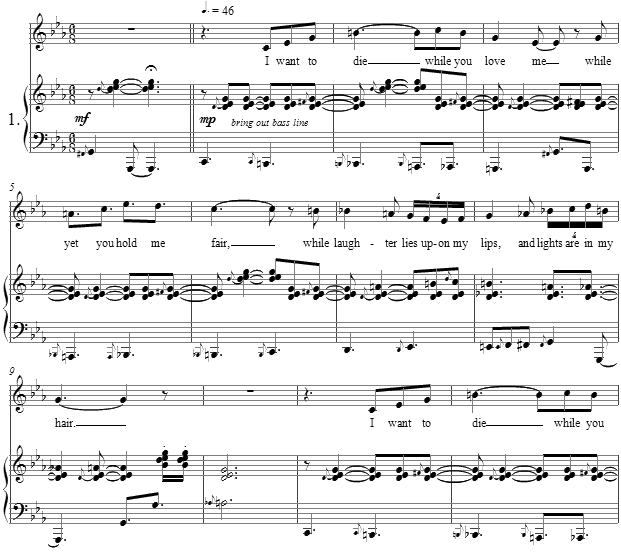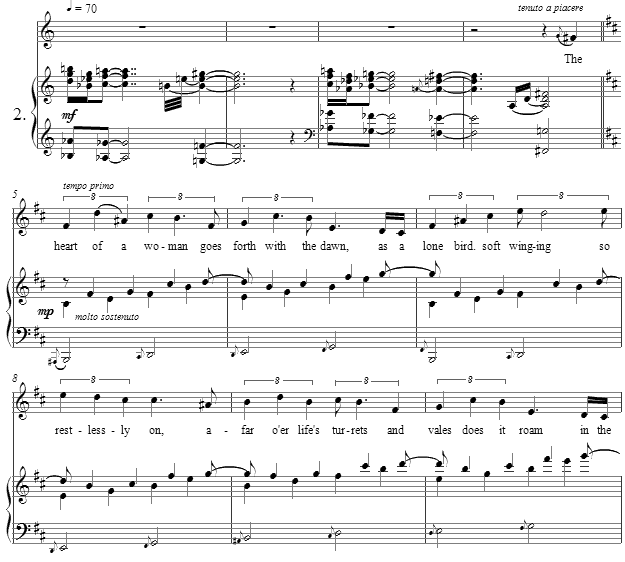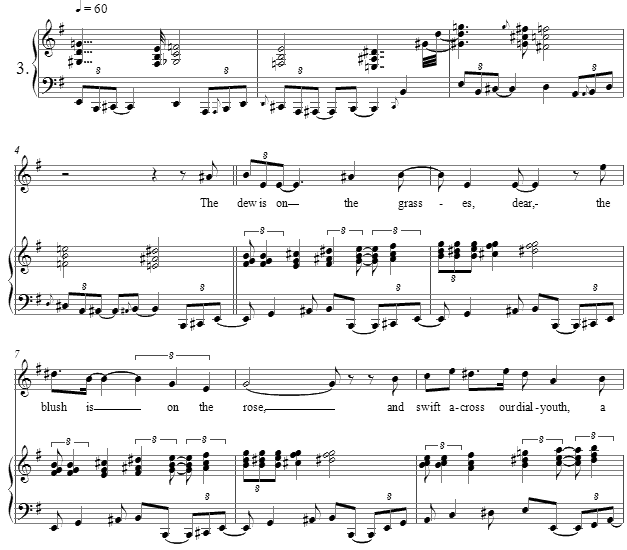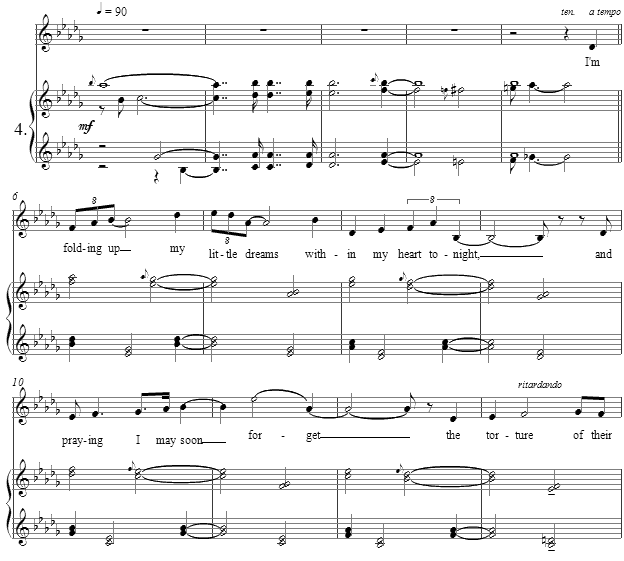Music and Texts of GARY BACHLUND
Vocal Music | Piano | Organ | Chamber Music | Orchestral | Articles and Commentary | Poems and Stories | Miscellany | FAQs
Four Songs of a Woman - (2007)
Georgia Douglas Johnson
for medium voice and piano
i. I Want to Die While You Love Me [ 3 pages, circa 2' 15" ]
I want to die while you love me,
While yet you hold me fair,
While laughter lies upon my lips
And lights are in my hair.
I want to die while you love me,
Your kisses turbulent, unspent
To warm me when I’m dead.
I want to die while you love me
Oh, who would care to live
Till love has nothing more to ask
And nothing more to give!
I want to die while you love me
And never, never see
The glory of this perfect day
Grow dim or cease to be.
ii. The Heart of a Woman [ 3 pages, circa 2' 15" ]
The heart of a woman goes forth with the dawn,
As a lone bird, soft winging, so restlessly on,
Afar o’er life’s turrets and vales does it roam
In the wake of those echoes the heart calls home.
The heart of a woman falls back with the night,
And enters some alien cage in its plight,
And tries to forget it has dreamed of the stars
While it breaks, breaks, breaks on the sheltering bars.
iii. Youth [ 2 pages, circa 1' 30" ]
The dew is on the grasses, dear,
The blush is on the rose,
And swift across our dial-youth,
A shifting shadow goes.
The primrose moments, lush with bliss,
Exhale and fade away,
Life may renew the Autumn time,
But nevermore the May!
iv. My Little Dreams [ 2 pages, circa 1' 40" ]
I’m folding up my little dreams
Within my heart to-night,
And praying I may soon forget
The torture of their sight.
For Time’s deft fingers scroll my brow
With fell relentless art-
I’m folding up my little dreams
To-night, within my heart!From The Book of American Negro Poetry, 1922. James Weldon Johnson, ed. (1871–1938)
[ Total duration - 10 pages, circa 7' 40" ]
Georgia Douglas Johnson
Georgia Douglas Johnson (1880-1966) was already in her mid-forties at the height of what came to be known as the "Renaissance." Chronologically she was not one of the younger writers who flourished during this period. In spite of her age, she remained young both at heart and in spirit and played a significant role as a writer and social arbiter through her 'Saturday night soirees.' A Washington Post obituary stated, “Her home at 1461 S Street, NW was once the site of a literary salon which attracted… established literary figures….”
Johnson was actively involved with other black American writers through her affiliation with groups like the Rendezvous Poetry Club, Poetry Council of the National Women’s Party, Poetry Society of Washington, Writer’s League Against Lynching, National Song Writer’s Guild, Poet Laureate League, League of American Writers, American Society of Africal Culture, and Negro Actor’s Guild.
She was born in Atlanta, Georgia on September 10, attended the public elementary schools in Atlanta, and in 1893 entered the normal course at Atlanta University (AU), graduating in 1896. Approximately a year before her death in June 1965, she received an honorary doctor of letters degree from Atlanta University. At the time, she was the oldest living graduate of the University. Also, Johnson studied music at Oberlin Conservatory (Ohio) and the Cleveland College of Music.
Georgia Douglas Camp was married in 1903 to Henry Lincoln Johnson, and had two sons, Henry Lincoln, Jr. and Peter Douglas. In 1901, they moved to Washington, DC where Henry Johnson established a law practice. Georgia was in Washington for 56 years until her death in 1966. After her husband's death in 1925, Mrs. Johnson became a conciliator for the Labor Department for eight years (1925-1934). Although working full-time, she continued to feverishly produce literary works and maintain a column for 20 weekly newspapers. Throughout her career she wrote poetry incessantly, edited close to 100 books, wrote over 40 plays and 30 songs. One of the poems, “I Want to Die While You Love Me,” was read at her funeral.
The literary gatherings that she hosted were very popular with the young writers as well as those who served as mentors. In 1925, Georgia Douglas Johnson began to host these literary evenings in her home. These salon gatherings were another milestone for the New Negro Renaissance. Her Saturday Nighters Club in Washington, as the group of individuals was called, was frequented by Jean Toomer, Langston Hughes, and many more prominent writers and poets.
Johnson’s second volume of poetry, Bronze, appeared in 1922. By this time she was an active member of those writers who were bridging the genteel age and the "New Negro." In this volume, she dealt with segregation and racism. Such themes placed her among the racially conscious poets of this period. Her third volume of verse, An Autumn Love Cycle (1928), with an introduction by Alain Locke, focuses on the various states of love. In that introduction Locke states that “Mrs. Johnson…in a simple declarative style, engages with ingenuous directness the moods and emotions of her themes.”
Although Johnson is best known for her poetry, she was an avid and successful playwright. Her first work to receive recognition was “Blue Blood,” which received an honorable mention in the 1926 Opportunity contest. Johnson’s second play, Plumes, won a first prize in Opportunity’s 1927 literary competition. It is a folk tragedy set in the rural South. It was published in an anthology, Plays of Negro Life: a Source Book of Native American Drama by Alain Locke and T. Montgomery Gregory. Johnson wrote a number of “lynching plays.” There was great deal of controversy on the subject of lynching during the 1920s. These plays included the following: Blue-eyed Black Boy, Safe, and A Sunday Morning in the South.
I choose to title this short cycle of songs Songs of a Woman, for the age of overt racism is passing, and the sentiments of Johnson's poetry remain pertinent to this day as to tomorrow. The themes of the four poems taken together is one of love and lost love, of the passage of time and the utter necessity of accepting it. As she so wisely declares, "I'm folding up my little dreams...."
The opening song retains a common "Klang" throughout, the minor second of D and E-flat, as a moving bass line opposes the vocal line. It is at first a simple strophic form of nine measures length The vocal line varies as the strophes continue, with higher tones to stress the intensity of this woman's romantic wish.
The second song is a melody in triplets opposing a two-measure periodic gesture in a strict duple meter. The opening gesture makes a break from the first setting's tonality to introduce the second. The text tells of the pendulum-like reality of a woman's "going forth" and "falling back."
The third setting builds of the major and minor thirds of the opening chords and the augmented fourth of the vocal line and harmonic underpinning. The practical advice from the elder to someone younger still retains a sense of irritation and longing unrelieved.
The last setting slips away from the jazzy harmonic vocabulary with a more timeless message, that, with time's passing, does does "torture" pass.




